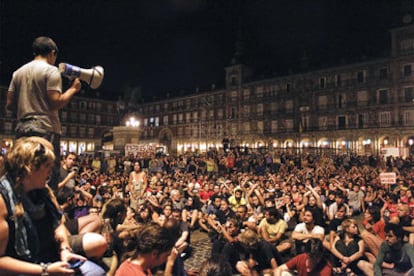Sol power: the 15-M story so far
EL PAÍS charts the key moments of the popular protest movement
» May 15. The 15-M movement is born. The collective Real Democracy Now! brings together thousands of people in a number of squares in Spain in the build-up to the municipal elections. The Madrid protest sees 24 arrests. That night, 30 people decide to camp out in Sol square. The 15-M movement is born.
» May 16. First assembly. The protestors camped out in Sol hold their first meeting. They make clear that they do not support any political party. The next day, 18 of those arrested appear in court. By the night of May 17, the number of people camped out has risen to more than 200. The police clear them out, without any incidents.
» May 18. The protestors stay put. The camp springs up in Sol once more, with no opposition. The Madrid electoral commission bans any demonstrations but thousands of people ignore the decision and pack out the square. The improvised work groups from the first days of the movement are organized into eight commissions.
» May 19. The electoral commission intervenes. The commission bans the demonstration on May 21, which is a "day of reflection" ahead of the elections, when no campaigning is allowed. The movement continues with its assemblies. On May 20, similar protest camps spring up in Barcelona, Bilbao, Valencia and Seville, as well as in other countries.
» May 21. Day of reflection. Thousands of people take part in the "collective reflection" before the elections the next day. By midnight, Sol is full: more than 25,000 people flock to the square.
» May 22. "They don't represent us." The assembly votes to stay at the camp "another week, at the least." Many protestors announce that they will exercise their right to vote in spite of their criticism of the parties. The slogan of the movement becomes: "They don't represent us." There is no mention of the triumph of the conservative Popular Party at the polls, or the Socialist defeat.
» May 24. Complaints begin. The camp has been in place for 10 days. Business owners in the area complain about a fall in sales and call for an end to the occupation.
» May 27. Police charge in Barcelona. The Barcelona police force enters the camp in the Catalan capital. The resulting struggles between officers and demonstrators leave 121 people injured. The Madrid regional government calls on the Interior Ministry to throw the protestors out of Sol.
» May 28. Protests reach the neighborhoods. For the first time, assemblies take place in 41 neighborhoods in the capital and 80 municipalities in the region. Weekly meetings are called, with the minutes later published on the web (madrid.tomalosbarrios.net).
» June 7. The end of consensus. The Sol assembly decides to dissolve the camp on June 12. The unanimity, which until that point had been one of the key elements of the movement, breaks down. A minority vows to stay put in Sol.
» June 8. Congress. Around a thousand protestors demonstrate outside Congress. On June 11, there are protests outside city councils as new mayors are sworn in.
» June 12. Operation Patena. The protestors strike the camp and clean up Sol, with the assistance of municipal cleaners. A permanent information point is left in place, as are 20 or so protestors.
» June 15. Violence in Barcelona. Hundreds of people stop politicians in Barcelona from accessing the Catalan parliament.
» June 19. Demonstrations. Thousands of people take part in 98 protests, which take place in Spain and other parts of the world.
» June 29. The other debate. While Congress plays host to the State of the Nation debate, the protestors hold another assembly, calling it "The people's debate."
» July 25. A Nobel in the park. Nobel Prize-winner Joseph Stiglitz makes a surprise appearance at a 15-M assembly in Madrid, urging the protestors to continue.
» July 27. Police failure. The authorities try, but fail, to break up the camp in the Paseo del Prado, near Congress.
» August 2. The police manage to clear the last camps in the Paseo del Prado and Sol.

Tu suscripción se está usando en otro dispositivo
¿Quieres añadir otro usuario a tu suscripción?
Si continúas leyendo en este dispositivo, no se podrá leer en el otro.
FlechaTu suscripción se está usando en otro dispositivo y solo puedes acceder a EL PAÍS desde un dispositivo a la vez.
Si quieres compartir tu cuenta, cambia tu suscripción a la modalidad Premium, así podrás añadir otro usuario. Cada uno accederá con su propia cuenta de email, lo que os permitirá personalizar vuestra experiencia en EL PAÍS.
¿Tienes una suscripción de empresa? Accede aquí para contratar más cuentas.
En el caso de no saber quién está usando tu cuenta, te recomendamos cambiar tu contraseña aquí.
Si decides continuar compartiendo tu cuenta, este mensaje se mostrará en tu dispositivo y en el de la otra persona que está usando tu cuenta de forma indefinida, afectando a tu experiencia de lectura. Puedes consultar aquí los términos y condiciones de la suscripción digital.








































